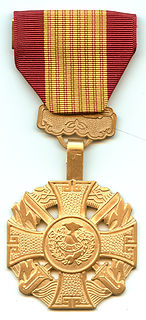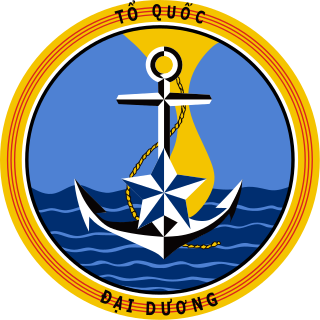 W
WThe Republic of Vietnam Military Forces, were the official armed defense forces of the defunct Republic of Vietnam and was responsible for the defense of the state since its independence from France in July 1954 to its demise in April 1975.
 W
WThe Army of the Republic of Vietnam were the ground forces of the South Vietnamese military from its inception in 1955 to the Fall of Saigon in April 1975. It is estimated to have suffered 1,394,000 casualties during the Vietnam War.
 W
WThe Army of the Republic of Vietnam Special Forces were the elite military units of the Army of the Republic of Vietnam (ARVN). Following the establishment of the Republic of Vietnam in October 1955, the Special Forces were formed at Nha Trang in February 1956. During the rule of Ngô Đình Diệm, the Special Forces were run by his brother, Ngô Đình Nhu, until both were assassinated in November 1963 in a coup. The Special Forces were disbanded in 1975 when South Vietnam ceased to exist after the Fall of Saigon.
 W
WThe Civilian Irregular Defense Group program was a program developed by the U.S. government in the Vietnam War to develop South Vietnamese irregular military units from minority populations.
 W
WThe Republic of Vietnam Gallantry Cross also known as the Vietnamese Gallantry Cross or Vietnam Cross of Gallantry is a military decoration of the former Government of South Vietnam. The medal was created on August 15, 1950 and was awarded to military personnel, civilians, and Armed Forces units and organizations in recognition of deeds of valor or heroic conduct while in combat with the enemy.
 W
WThe Good Conduct Medal was a military decoration of South Vietnam. Established in 1964, the medal recognized the display of exemplary conduct and discipline. It also required three years of service in the Republic of Vietnam Armed Forces.
 W
WThe Joint General Staff (JGS) was a body of senior uniformed leaders in the South Vietnamese military which advised the Ministry of National Defence and the President of South Vietnam.
 W
WFlags of the Republic of Vietnam Military Forces. Most of the flags used by the South Vietnam military since 1955 to 1975.
 W
WThe Republic of Vietnam National Police Field Force, also designated Police de Campagne by the French and variously as National Police Field Force (NPFF), Field Police or Field Force for short by the Americans, was a paramilitary élite branch of the Republic of Vietnam National Police. Active during the Vietnam War, the CSDC operated closely with the Army of the Republic of Vietnam (ARVN) and the American Central Intelligence Agency (CIA) from 1966 to 1975.
 W
WThe Republic of Vietnam Navy was the naval branch of the South Vietnamese military, the official armed forces of the former Republic of Vietnam from 1955 to 1975. The early fleet consisted of boats from France. After 1955 and the transfer of the armed forces to Vietnamese control, the fleet was supplied from the United States. With assistance from the U.S., the VNN became the largest Southeast Asian navy, with 42,000 personnel, 672 amphibious ships and craft, 20 mine warfare vessels, 450 patrol craft, 56 service craft, and 242 junks.
 W
WThe River and Coastal Police – RCP, also variously designated as Marine Police and 'Police Nautique' or 'Police Fluviale et Côtière' in French, was the "naval" branch of the Republic of Vietnam National Police, active from 1965 to 1975.
 W
WThe South Vietnamese Regional Forces were a component of Army of the Republic of Vietnam (ARVN) territorial forces. Recruited locally they served as full-time province-level defence forces. In 1964, the Regional Forces were integrated into the ARVN and placed under the command of the Joint General Staff.
 W
WThủ Đức Military Academy was an officer training school of the Army of the Republic of Vietnam. It was located in the Thủ Đức District of the capital Saigon.
 W
WThe Republic of Vietnam Staff Service Medal was a military award of South Vietnam established in 1964. The medal was awarded in two classes and was awarded for outstanding initiative and devotion an individuals assigned staff duty.
 W
WOn March 8, 1949, after the Élysée Accords, the State of Vietnam was recognized by France as an independent country ruled by Vietnamese Emperor Bảo Đại. The Vietnamese National Army or Vietnam National Army was the State of Vietnam's military force created shortly after that. It was commanded by Vietnamese General Hinh and was loyal to Bảo Đại. The VNA fought in joint operations with the French Union's French Far East Expeditionary Corps (CEFEO) against the communist Việt Minh forces led by Ho Chi Minh. Different units within the VNA fought in a wide range of campaigns including the Battle of Nà Sản (1952), Operation Hautes Alpes (1953), Operation Atlas (1953) and the Battle of Dien Bien Phu (1954).
 W
WThe South Vietnam Air Force, officially the Republic of Vietnam Air Force was the aerial branch of the Republic of Vietnam Military Forces, the official military of the Republic of Vietnam from 1955 to 1975.